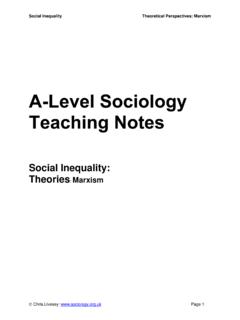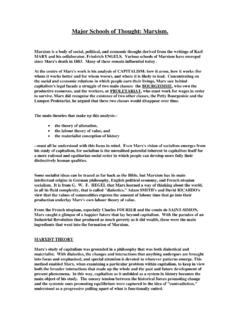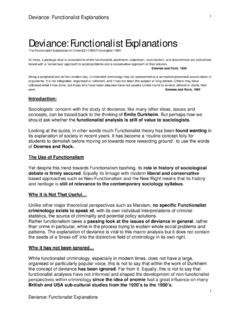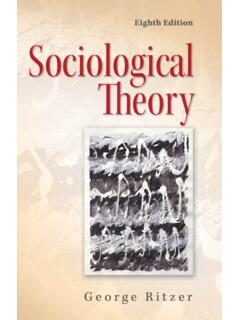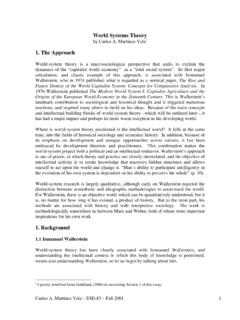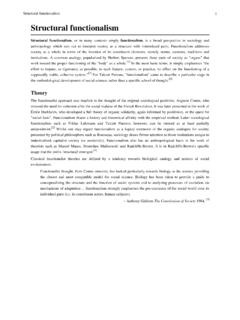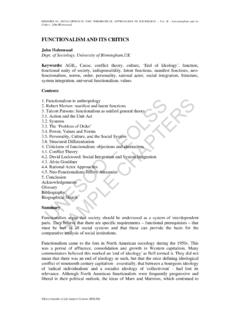Transcription of Marxism: Structural Conflict Theory - Sociology
1 marxism : Structural Conflict Theory marxism : Structural Conflict Theory 1 1 marxism : Structural Conflict Theory marxism : Structural Conflict Theory /23/4/98 disc, 1994 Introduction, A Reprise of Functionalism How Functionalists See the World Functionalists stress the importance of value consensus in society, and do not recognize that Conflict may occur. Any Conflict that does occur is seen as temporary and counteracted, as society becomes better. Functionalists accept that there can be Conflict but these are of small importance compared to the general need for consensus and stability. Examples of Functional Analysis Shils and Young, for example, note how ceremonies and rituals serve to promote social integration.
2 The rituals concerning monarchy, church, government leaders, involve public promise. Whilst the family, can be seen as the role in plays for members of society, such as the stability of personality and socialization. Comparison to marxism Interpretation Introduction For Marxists, there is fundamental Conflict between different groups in society. This Conflict is on going and persistent and not temporary as claim Functionalists. marxism became particularly popular during the 1970 s as the realization that Functionalism was flawed became apparent. It takes its name from its founder Karl Marx (1818-83). There are many accounts of marxism I will attempt to give you a simplified approach in the notes that follow.
3 marxism : Structural Conflict Theory marxism : Structural Conflict Theory 2 2 Basic Ideas 1. How is Society Constructed? Marx noted that in order to survive we enter relationships in order to ensure production. The forces of production and the social relationship to this form the economic basis or infrastructure of society. The other aspects of society, known as the superstructure is shaped by the infrastructure. So for example, The Education system is shaped by economic factors according to Marx. Any change in the infrastructure will thus lead to changes in the superstructure. Marx claims that all societies today contain contradictions. Another exploits what he means by this is that one social group.
4 This creates Conflict of interests, as one social group, the owners of the factors of production benefits on the back of the others (the workers). He believed that such a position could not continue. According to Marx, society is constructed from classes. In all societies, except the simplest, there are two major classes. It is people s relationship to the means of production that determines which class they belong to. The most powerful class is that which owns the means of production, (land, labour, factories) and the least powerful is that which has to sell its labour to make a living. How does society operate or function? Explaining the Contradictions 1. The First Contradiction: Wages versus Profit Achieved by the Bourgeoisie In Marx s view, society operates mainly through class Conflict .
5 In particular he argues that capitalistic society the bourgeoisie and the proletariat are fundamentally opposed. Marx believes that real wealth was only created by the labour power of the workers. Yet the wages that are paid to them is well below that taken in profit by the people who own the factors of production. This is a major contradiction. 2. The Second Contradiction: Organization versus the Nature of Ownership In capitalism large numbers of workers, acting collectively achieves production. In contrast, just one individual owns the factors of production and the profits do not flow to the workers who have organized themselves collectively. marxism : Structural Conflict Theory marxism : Structural Conflict Theory 3 3 2.
6 What Causes Social Change? Major changes according to Marx are a result of new forces of production. He used the change from Feudal society run by the noblemen, clergy, and commoners and based upon heredity. So there was little movement within the system. Feudalism was based upon ownership of the land. The commoners who worked the land have to give part of their produce to the landowners; in return, the landowners protected them to rival noblemen. Therefore, the change between this system and capitalism resulted in contradictions. For example, capitalism is based upon wage labour, whereas feudalism was based upon mutual obligations. The new order, capitalism took over, it swept out the old social relationships of feudalism and replaced them with the new.
7 Marx called this a new Epoch. Eventually Marx believed there would be a final Epoch where a communistic or socialist society would take over from capitalism. This will not be the result of a new force of production, but will get rid of the contradictions that so far characterized change between Epochs. Collective production would remain but ownership would change dramatically. Instead of the Bourgeoisie, owning the factors of production ownership will be by all. Members would share wealth that their labour produces. This new infrastructure would not be based upon exploitation and contradictions, instead a new final epoch would be born, one, which would have no need to change. It would thus result in the end of history.
8 3. Why has Capitalism Survived given These Massive Contradictions? Capitalism has remained durable, in the West it has survived for 200 years. Marx claimed this is the result of the role of the superstructure, which is shaped by the infrastructure. So for example, the ruling elite has monopolized political power, laws, and other institutions to maintain their control. They have thus managed to legitimate their power and hide from the people the true nature of their exploitation. Propagating the ideas of equality and freedom has done this. For example, the relationship between the worker and the owner of the factors of production is seen as equal exchange. However, in reality it is not, although there is a degree of choice of who to work for, in reality we must work to survive.
9 In Marx s words, all we can do is exchange one form of wage slavery for another. More importantly, the ruling elite is able to dominate the ideology of the time. They are able to produce a false picture of the world as it is. Moreover, to stop us seeing the contradictions. We see our exploitation as just, natural, and proper. Marx calls this a false consciousness of reality. Marx believes this false consciousness will only work so long. Eventually people will see behind it. marxism : Structural Conflict Theory marxism : Structural Conflict Theory 4 4 Comparison with Functionalism/ Structural Consensus Theory Functionalism Whereas functionalism emphasizes consensus, shared norms and values and uses concepts like order, harmony, cohesion, integration and equilibrium, marxism Conflict theorists take a different view.
10 This perspective emphasizes the differences between interest groups, and uses concepts like control coercion, power, constraint, discensus and change. The central theme or thesis of Conflict Theory is that Conflict is an inevitable fact. Weber and Conflict Theory Max Weber s contribution to Conflict Theory , like Marx before him, represents only one part of his enormous contribution to sociological Theory . He is sometimes referred to as the bourgeois Marx because so much of his work was concerned with testing, reassessing or developing Marx s ideas. Like all the major theorists of class structure, Weber began with Marx s formulation of the question and accepted that class is economic in its origin.
